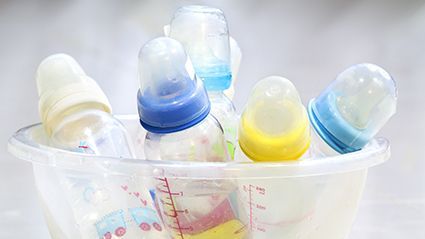WEDNESDAY, May 11, 2022 (HealthDay News) – The U.S. Food & Drug Administration announced Tuesday that it is continuing its efforts to boost the country’s supply of infant formula.
Amid shortages due to high demand amid recall and supply issues, stores have limited the number of products consumers can purchase. Mothers across the United States have been desperately searching for more formula: Some are driving several hours, only to find more empty shelves, while others have looked up homemade infant formula recipes online.
But the FDA has advised parents not to try to make formula at home.
“We recognize that many consumers have been unable to access infant formula and critical medical foods they are accustomed to using and are frustrated by their inability to do so. We are doing everything in our power to ensure there is adequate product available where and when they need it,” FDA Commissioner Dr. Robert Califf said Tuesday in an agency news release.
“Ensuring the availability of safe, sole-source nutrition products like infant formula is of the utmost importance to the FDA,” Califf continued. “Our teams have been working tirelessly to address and alleviate supply issues and will continue doing everything within our authority to ensure the production of safe infant formula products.”
For Darice Browning, of Oceanside, Calif., the shortage has been so bad that she considered going to the emergency room to feed her 10-month-old daughter, Octavia, who has rare genetic conditions that make it impossible for her to eat solid foods. The food allergies she shares with her 21-month-old sister, Tokyo, cause both babies to vomit blood if they ingest dairy proteins.
At one point, Browning said she desperately called all of her daughters’ doctors looking for formula, to no avail.
“I was freaking out, crying on the floor and my husband, Lane, came home from work and he’s like, ‘What’s wrong?’ and I’m like, ‘Dude, I can’t feed our kids, I don’t know what to do,’” Browning told The New York Times.
As of Tuesday, she had four cans of formula left for Octavia — all of them on the recall list — and was trying to stretch out her supply with smaller rations.
Rudi Leuschner is an associate professor of supply-chain management at Rutgers Business School. Speaking with the Times, he said that “some industries are very good at ramping up and ramping down. You flip a switch and they can produce 10 times as much. Baby formula is not that type of a product.”
The FDA’s latest moves might help ease the dire situation many moms face.
Among the steps the agency has taken include using a food supply chain continuity system, developed during the pandemic, to monitor the status of infant formula supply.
Agency officials are also meeting regularly with major infant formula manufacturers to understand their production capacity, including their ability to ramp up production. Some manufacturers are meeting or exceeding capacity levels, the FDA said.
Several infant formula manufacturers are working to increase output by prioritizing the products that are most needed, as well as optimizing production schedules, the agency added.
The FDA is also helping manufacturers bring safe products to the market by quickly reviewing manufacturing changes that will help speed production, especially for specialized formulas for medical needs.
Another FDA effort is watching trends for in-stock rates regionally and nationally to know where formula is most needed and working with retailers to ask their members to place purchase limits on some products.
The FDA said it is helping ease foreign shipments by employing more flexibility for allowing products from abroad that are already permitted into the United States, including a streamlined import entry review for certain products from foreign facilities that have good inspection records.
The shortage first began in February, when Abbott Nutrition’s Sturgis, Mich. plant issued a voluntary recall of some of its powdered infant formula products. On a case-by-case basis, the FDA is allowing formula from that facility to be released to people who need urgent, life-sustaining supplies of certain specialty and metabolic formulas.
The benefits of allowing caregivers in consultation with their medical providers to access these products may outweigh the potential risk of bacterial infection, the FDA said.
The agency said it is also working with other major infant formula manufacturers to increase supply and help ensure that production of infant formula products can safely resume at Abbott’s Michigan plant.
More information
The American Academy of Pediatrics has tips for parents to the infant formula shortage.
SOURCE: U.S. Food & Drug Administration, news release, May 10, 2022; The New York Times
Copyright © 2026 HealthDay. All rights reserved.

